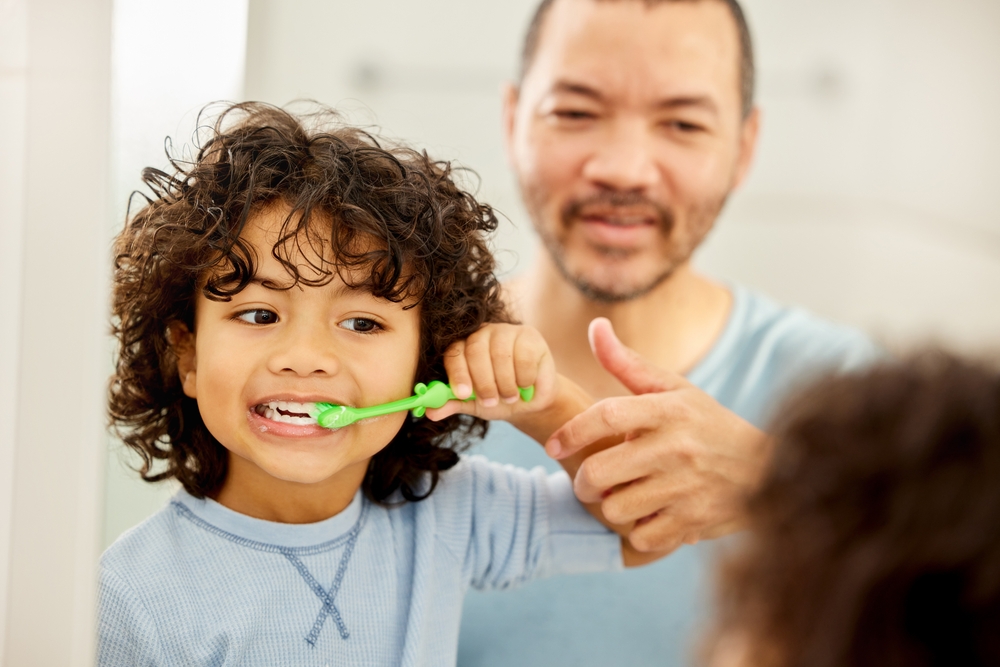It is easy to think that baby teeth are not worth much care because they will fall out anyway, but this leads to early dental caries and a lot worse conditions in later life. Many parents are confused about when and how to begin oral care for their children.
You should be aware that you are not alone in wondering, “When should I brush my baby’s teeth?” Following the guidance of a pediatric dentist in Apollo Beach will help your children begin developing health-conscious behaviours.
We’ll look at when you can begin brushing your teeth and how to do it correctly.
When Should You Start Brushing Your Baby’s Teeth?
When your child’s first tooth erupts, which may occur around six months of age, you should begin brushing their teeth. Even before teeth erupt, gently wipe your baby’s gums with a fresh, moist towel after feedings to help avoid the buildup of bacteria.
Using a baby toothbrush with soft bristles and a rice-sized dollop of fluoride toothpaste is recommended when the first tooth erupts. This helps prevent degradation of their sensitive enamel without overdoing the fluoride in their mouths.
Why Is Early Oral Hygiene So Important?
You may wonder why brushing baby teeth matters if they’re just going to fall out. The truth is, early oral hygiene plays a big role in your child’s overall health. Baby teeth:
- Help children chew properly and speak clearly
- Guide the alignment of permanent teeth
- Build confidence with a clean, bright smile
Neglecting baby teeth can lead to cavities, infections, and early tooth loss, which might cause long-term dental problems.
Brushing Baby Teeth: What Parents Need to Know
When it comes to brushing baby teeth, here’s what you should keep in mind:
Use the Right Technique
- Brush in the morning and at night.
- Make use of a tiny toothbrush with soft bristles and a rounded head.
- Clean every tooth surface gently while holding the brush at a 45-degree angle.
Choosing a Toothbrush: What to Look For
Choosing a toothbrush that suits your child’s age and comfort is important. Here are a few tips:
- Babies (0–2 years): Use a tiny baby toothbrush or finger brush with extra-soft bristles.
- Young children (ages 2–4): Select a toothbrush with a thick handle and a tiny head for improved grip.
- For older kids (5+ years old), letting them select their brush makes brushing enjoyable and promotes self-reliance.
Changing toothbrushes after every 3 to 4 months is recommended.
How Can You Make Brushing Fun for Kids?
It doesn’t have to be difficult to brush. Here are some ideas for adding excitement to dental care:
- While brushing, sing along to music or set a two-minute timer.
- Use their favourite cartoon character with an entertaining toothbrush.
- Make brushing a game or a way to earn rewards.
- Children enjoy imitating their parents, so brush together!
What If Your Child Hates Brushing?
Some resistance is normal. If your child refuses to brush, try these gentle strategies:
- Let them choose the toothbrush or toothpaste flavour.
- Brush their favourite stuffed animal’s “teeth” first.
- Praise them or give a sticker after brushing.
- Stay calm and consistent; don’t turn it into a punishment.
Also, talk to your child’s dentist about concerns or techniques that could help ease the routine.
When Should Your Child See a Dentist?
When a child is one year old, or within six months of the emergence of their first tooth, they should see a dentist for the first time. Early dental appointments are important to identify potential issues and make your child feel comfortable while undergoing treatment.
During these appointments, the dentist will check your child for cavities, monitor the development of their teeth, and provide you with special advice based on your child’s age and dental needs.
Red Flags Parents Should Watch For
If you notice any of the following, schedule a dental visit:
- Brown or white spots on teeth
- Red, swollen, or bleeding gums
- Bad breath that doesn’t go away
- Visible holes or pits in the teeth
- Pain or sensitivity when eating
These could be early signs of decay or gum disease, and early treatment is key.
The First Step to a Lifetime of Bright Smiles
Dental care begins long before the first adult tooth appears, and parents play a crucial role in shaping healthy habits that last a lifetime. From brushing baby teeth correctly to choosing the right toothbrush, every step counts in protecting your child’s oral and overall health.
If you’re unsure where to begin or need advice tailored to your child’s age, visiting a pediatric dentist in Apollo Beach is the best first step. At Smile Lynn Pediatric Dentistry, we provide expert care in a warm, child-friendly environment.
Whether you’re caring for a teething toddler or helping a school-aged child learn to brush independently, our team is here to guide you.
Don’t wait for problems to arise, give your child the best start with regular checkups and guidance from a trusted dentist near you.
